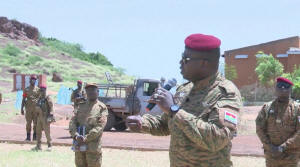Gunfire and blasts in Burkina Faso capital raise fears of another coup
 Send a link to a friend
Send a link to a friend
 [September 30, 2022]
By Thiam Ndiaga and Anne Mimault [September 30, 2022]
By Thiam Ndiaga and Anne Mimault
OUAGADOUGOU (Reuters) -Soldiers took to the
streets of Burkina Faso's capital on Friday and blocked access to
administrative buildings after gunfire rang out and a blast was heard
near the presidential palace, raising fears of a second military coup in
eight months.
Gunshots were first heard around dawn at the main military camp in
Ouagadougou and in some residential areas, Reuters reporters said. Then
came the blast near the palace. State television stopped broadcasting.
By mid morning, the city, usually buzzing with motorbikes and cars, was
quiet. Military vehicles were stationed along deserted streets. Schools,
businesses and banks were shut.
The U.S. Embassy urged American citizens to limit their movement.
A government spokesman could not be reached.

It was not clear yet if the gunfire and blast were part of a coup
attempt, but security sources say there has been frustration within the
military at a lack of progress in combatting Islamist miltants.
A junta led by Colonel Paul-Henri Sandaogo Damiba took power in Burkina
Faso in a coup on Jan. 24.
The latest unrest bore the hallmarks of other power grabs that have
swept across West and Central Africa over the past two years, undoing
decades of democratic progress.
The coups have been driven in part by violence committed by Islamist
groups who have taken over large areas of northern Burkina Faso and
parts of neighbouring Mali and Niger.
Civilian populations have cheered military juntas in the vain hope that
they would be more successful at containing the insurgents than their
democratically-elected predecessors.
"If successful, it would mark the sixth unconstitutional takeover in the
Sahel in the past two years," said Eric Humphery-Smith, Senior Africa
Analyst at risk intelligence company Verisk Maplecroft.
"If it isnít, itís still a damning indictment for the state of democracy
in the region."
ANOTHER COUP?
Junta leader Damiba's whereabouts were unknown on Friday. His government
had been expected to hold a press conference on Friday afternoon to
brief the media on the security situation.
His January takeover was largely celebrated by civilians fed up with the
inability of former President Roch Kabore's civilian government to rein
in militants linked to Islamic State and al Qaeda. The militants have
killed thousands of civilians in Burkina Faso in recent years.
[to top of second column]
|

President of Burkina Faso Lieutenant
Colonel Paul-Henri Damiba visits 14th Inter-Arms Regiment soldiers
in Djibo, Burkina Faso September 29, 2022 in this still image
obtained from a video. Burkina Faso Presidency/REUTERS TV via
REUTERS

Damiba, often seen in public in military fatigues and aviator
sunglasses, pledged to restore security.
But attacks in the impoverished West African country have worsened
and the army is in disarray. The rank and file, which gave Damiba
their support in January, have grown frustrated, security sources
say.
PROTESTS
This week, unknown assailants killed 11 soldiers in an attack on a
150-vehicle convoy taking supplies to a town in northern Burkina
Faso. Fifty civilians are missing.
Militants have blockaded areas of the north, leaving communities
stranded. Government convoys and air drops deliver essential goods
to trapped civilians.
Meanwhile, many cities and towns not under siege have seen their
populations swell as people flee the violence from the countryside.
Health systems are stretched. Drought has led to high levels of
malnutrition.
Protests against the military have cropped up in cities across
Burkina Faso this week, including one in the northern town of Kaya
on Saturday, to demand that the government do more to improve the
security situation.
Much of the country has become ungovernable since 2018. Millions
have fled their homes, fearing further raids by gunmen who
frequently descend on rural communities on motorbikes.
Burkina Faso has become the epicentre of the violence that began in
neighbouring Mali in 2012 but which has since spread across the arid
expanse of the Sahel region south of the Sahara Desert.

As well as Burkina Faso, Mali, Chad, and Guinea have all seen coups
since 2020, raising fears about a backslide towards military rule in
a region that has made democratic progress in recent decades.
(Writing by Edward McAllister and Bate Felix, Editing by Angus
MacSwan, William Maclean and Toby Chopra)
[© 2022 Thomson Reuters. All rights
reserved.]
This material may not be published,
broadcast, rewritten or redistributed.
Thompson Reuters is solely responsible for this content. |